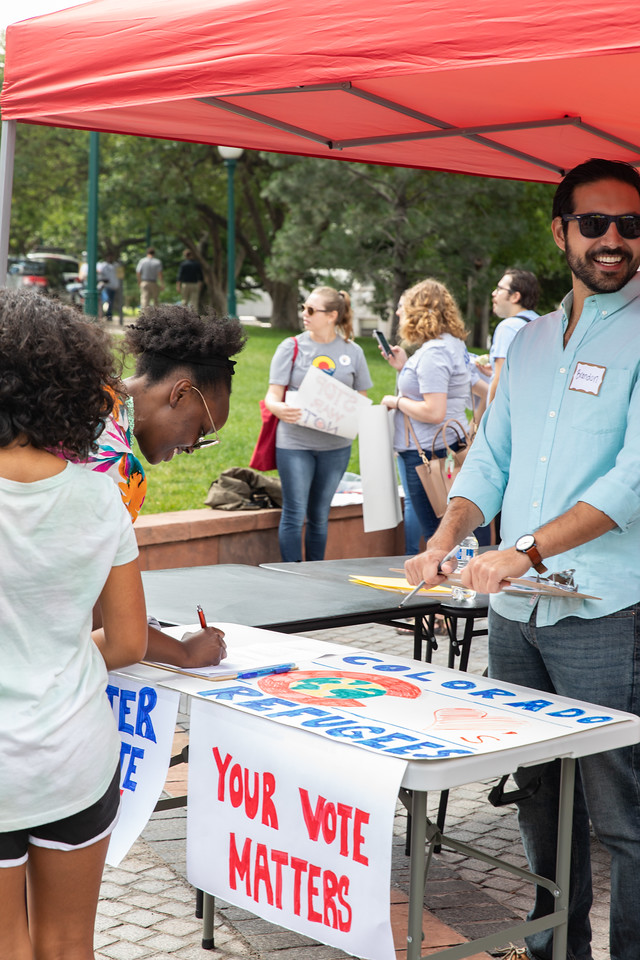After a weekend of unrest in Denver, it might be time for many people to sit down and decide the actions they want to take going forward to enact the change they want to see in the world. One of the most powerful tools American citizens have at their disposal is the right to vote — and not just for the president. There are countless other elections that are just as or more important — local judges, district attorneys and state and federal representatives are just a few examples.
And 2020 is a big year for voting. On November 3, the following categories will be eligible for election or retention, following the results of the June 30 primaries. That means you have five months to do some research, refine your stances, register and then show up to vote (or mail in a ballot).
2020 Elections

Senator Cory Gardner. Photo by Jonina Diele.
US President: This is the most obvious election coming up in 2020 with three notable candidates — Donald Trump (R), Joe Biden (D) and Jo Jorgensen (I). For constant election updates and an overview of the candidates, check out this page.
US Senate: This election will fill the Senate seat currently held by Cory Gardner (R), who was first elected in 2014. According to Ballotpedia, Colorado’s US Senate election this year is expected to be a battleground race, along with three other states. This means that there’s reasonable evidence to assume the election will “have a meaningful effect on the balance of power in governments or to be particularly competitive or compelling.” The general candidate list is not finalized yet, though it includes Veronique Bellamy (Socialist Party), Stephan Evans (Unity Party), Joseph Camp (I), Martha Wolf (I), John Hickenlooper (D), Andrew Romanoff (D), Cory Gardner (R) incumbent, Raymon Doane (L) and Gaylon Kent (L). The results of the June 30 primary will be updated on this page.
US House of Representatives: Voters in Colorado will elect seven candidates to serve in the House this year, one from each of the congressional districts. Currently, four of the seats are occupied by members of the Democratic Party. Denver is in District 1 and the incumbent is Diana Degette (D) and she is the only Democratic primary candidate running. The other candidates, still undecided until after June 30, are Kyle Furey (L), Paul Fiorino (Unity Party), Joseph Camp (I) and Shane Bolling (R).
Colorado Senate: Working alongside the state’s House of Representatives and the Governor of Colorado to create laws and deal with the state’s budget, the Colorado State Senate has a total of 35 seats. This year, 18 of the 35 seats are up for election, including six districts in and around Denver — Districts 19, 26, 27, 28, 31 and 33. See the district map here.
Colorado House of Representatives: All 65 of the state’s House seats are up for election this year. In 2018, the Democratic Party expanded its majority from 36-29 to 41-24. If the Democratic Party keeps the majority in the State House and Senate, it will continue to hold its state government trifecta as long as Governor Jared Polis is in office.
Colorado Executive Offices: Six state executive offices are up for grabs this year — three for the State Board of Education and three for the University of Colorado Board of Regents. Denver residents will vote for one of the Board of Education seats, with three candidates currently in the running — Lisa Escarcega (D), Donna Morganstern (D) and Sydnnia Wulff (R).
Colorado Supreme Court: The terms of two Colorado Supreme Court justices will expire on January 11, 2021, pending the retention vote in November of this year. A judicial retention vote is a yes or no vote to keep a justice or judge in their Governor-appointed position. It’s important to research how justices have presided over their term before voting on these retentions. Research their notable cases and read some of their statements. The two justices in this year’s election are Melissa Hart and Carlos Armando Samour Jr., both of whom were appointed by Governor John Hickenlooper (D) in 2017 and 2018, respectively.
Appellate Courts: Like the Colorado Supreme Court, the lower courts also have judges who must stand for retention. In 2020, there are four judges in the election — Daniel Taubman, John Webb, Craig Welling and Ted C. Tow.
Local Judges: Perhaps even more important than the previous two judicial retention elections are the local ones. The Colorado District Courts have 164 governor-appointed judges, except here in Denver where the mayor appoints them. Visit this page for a full list of Denver county judges.
State Ballot Measures: As of the publishing date of this article, there are four statewide ballot initiatives certified for the November election.
- The first will decide whether Colorado joins the National Popular Vote Interstate Compact, whose members agree to allocate their electoral college votes to the candidate who wins the national popular vote.
- The second and third are citizen initiatives — one specifies that only US citizens have the right to vote and one would reintroduce gray wolves in public lands.
- The final measure is another attempt at fixing our crumbling transportation infrastructure, requesting more than one billion dollars of TRANs or “transportation revenue anticipation notes” with no increase in taxes.
Helpful Resources

Your Vote Matters – Photo courtesy of Big Picture Media
Ballotpedia: An unbiased website with facts about anything you might be voting on, as well as information about previous election results. This site also includes all of the relevant dates for primaries, mail-in ballots, voting in person and more.
I Side With: Through a series of quizzes, you can find the best candidates for your interests and beliefs. You can also take quizzes about particular topics (i.e. gun control or abortion) to better understand your stance and how it relates to others who have taken the quiz.
DRIVE Project: The Denver Refugee and Immigrant Vitalization and Empowerment project seeks to activate engagement with immigrant and refugee communities and get them to vote. Read our article about the nonprofit to learn more.
Vote 411: This is one of the easiest sites to navigate and can be filtered by state. Once you find your state, the first piece of information you’ll see is the next date to vote. There’s also a lot of useful information about things like absentee ballot process, campaign finances and early voting. Everything is also available in Spanish.
Rock The Vote Election Reminders: Rock The Vote has just as much information as Vote 411, but they also offer an election reminder tool so that you never miss the chance to vote. On top of that, they offer a widget that anyone can put on their own website to remind others to vote.
GovTrack: To find out who is representing you in Congress at any time, check out this website and type in your zip code. It also details how your elected officials have voted in the past.
Colorado Secretary of State Election Information: Use this as your most trusted resource for registering to vote or for checking your registration.
